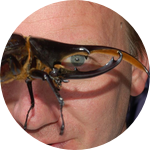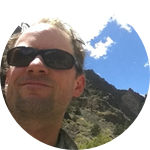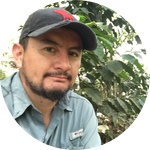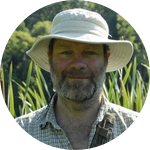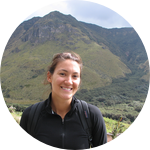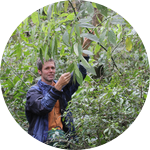About This Project
Parasitoid diversity is rapidly declining in La Selva Costa Rica, yet many species remain undescribed limiting our ability to understand how local extinction of parasitoids will impact ecosystem function and stability. Here, we explore the hypothesis that increased frequency of extreme weather events negatively affects tropical plant-insect-parasitoid interactions by measuring the impact of flooding on parasitism rates and interaction diversity.
Ask the Scientists
Join The DiscussionWhat is the context of this research?
We have over 20-years of data cataloguing interaction diversity among tropical host plant, lepidopteran herbivore and parasitoid species. We are concerned because our most recent analyses indicate staggering declines in parasitism rates and parasitoid diversity in Costa Rica. The time period in which we see this decline, we also see increased frequency of extreme precipitation events. We hypothesize that the change in climate in tropical ecosystems is resulting in declines in parasitism rates and parasitoid species diversity (Stireman et al. 2005). To test this, we need to expand our existing inventory of plant-caterpillar-parasitoid interactions at our two tropical sites: Yanayacu Biological Station in Ecuador and La Selva Biological Station in Costa Rica.
What is the significance of this project?
Parasitoid diversity is rapidly declining in La Selva Costa Rica. Amidst the fact that more than half of all described terrestrial organisms are involved in plant-insect-parasitoid interactions, data cataloguing tropical parasitoid species is scarce. Most specimens to date are singleton observations which do not provide enough data to calculate diversity and cataloguing interaction diversity requires the labor and time intensive task of collecting and rearing caterpillars for parasitoids. Thus, long-term data collected in this study will enable us to assess the impact of extreme weather events on ecological services and ecosystem stability provided by parasitoids. This will guide predictions on the impact of global climate change on ecological communities.
What are the goals of the project?
We will begin collection February 14th at La Selva and continue to collect samples through the year at both sites with the help of our field techs: Humberto and Wilmer. We will collect larval parasitoids from the lepidopteran hosts and adult parasitoids using malaise traps to document as many new and rare species of parasitic Hymenoptera and Diptera. We will sample various life history stages to understand population dynamics. Lastly, we will determine gene flow of focal parasitoids from natural forests to surrounding agriculture to help quantify loss of ecosystem services associated with loss of biodiversity. Our long term goal includes augmenting a one-of-a-kind dataset on tropical insect interactions so that we may continue to explore patterns of biodiversity.
Budget
Our ultimate goal is to raise money for 1-year of support for our field technicians, Wilmer Simbana and Humberto Garcia to continue the long term collection of parasitoids at both sites. More pressing, and the focus of this campaign, is the collection at La Selva given recent flooding events. We are aiming to fund 6 months of Humberto's salary and will cross our fingers to meet our stretch goal of $12,600 to also fund Wilmer. Any donations beyond our proposed goals will be used to pay their salary through the year! Their consistent work is crucial to answering questions across temporal gradients. All other costs related to collection (e.g malaise traps), curation supplies, and permits will be paid through an NSF Graduate Research Fellowship Program Grant.
Endorsed by
 Project Timeline
Project Timeline
Once funding is secured, we will be able to continue collection in Costa Rica for 6 months. If we raise our stretch goal, we can begin regular collection of parasitoids in Ecuador and have funds to pay for Wilmer's help for 6-months! This will enable broad sampling of tropical sites to see if these patterns are local or widespread. Once parasitoids are in hand we will identify and begin analyses.
Feb 13, 2018
Begin parasitoid collection
Feb 15, 2018
Lauch Campaign
Feb 15, 2018
Travel to Costa Rica to develop protocol with Humberto
Feb 16, 2018
Project Launched
Aug 13, 2018
Send samples to the University of Nevada, Reno to begin processing
Meet the Team
Team Bio
Dani Salcido is a PhD student within the Evolution, Ecology and Conservation Biology (EECB) Department at the University of Nevada, Reno in Dr. Lee Dyer's Lab. The Dyer Lab studies ecological and evolutionary questions related to chemically mediated tri-trophic interactions with a focus on plant-herbivore-parsitoid systems across the Americas. Dani met Lee as an Earthwatch teacher volunteer and decided to join his awesome lab group! The rest is history!
Danielle Salcido
I am currently pursuing my PhD in biology at the University of Nevada, Reno within the Ecology, Evolution and Conservation Biology program. My research focuses on patterns of interaction diversity across climatic, latitudinal, and disturbance gradients at various scales of interaction networks among caterpillars, their host-plants and parasitoids. I received my undergraduate degree in Biology at the University of California, Irvine then my California teaching credential at Cal State Long Beach. From 2009-2015 I taught high school biology and physics in Southern California. I participated as an Earthwatch volunteer in 2010 for a project in Ecuador called "Caterpillars and Climate Change". That program happened to be one of Dr. Lee Dyer's projects and inspired me to continue my education and become a graduate student. Now I have the joy of exploring questions related to earth's biodiversity and leading citizen science teams as a part of a collaboration with Earthwatch Institute . These opportunities have enabled me to do what I love the most: learn and teach the lessons of Mother Nature. On my free time, I enjoy hiking, mountain biking, traveling and being merry with family and friends.
Lee Dyer
DR. LEE DYER is an ecologist who has worked with a variety of organisms in the tropics for the past 24 years and in temperate areas for the past 28 years. He received a B.S. in biochemistry and English from the University of California at Santa Barbara and a Ph.D. in ecology from the University of Colorado, Boulder. Lee was a professor for five years at Mesa State College in Colorado where he established the Western Colorado Center for Tropical Research. He is now a professor in the Biology Department at the University of Nevada, Reno. Lee spends his free time hanging out with his son, rock climbing, listening to music, and reading books. He is in charge of all aspects of the project, and his specialties relevant to the project are statistical modeling, community ecology, caterpillar natural history, and basic natural products chemistry.
Humberto Garcia L
Humberto is a field assistant on the project.
Wilmer Simbaña
Wilmer is a field assistant on the project.
Additional Information
Any donations of $100+ will receive one of my favorite caterpillar or parasitoid prints from the field.
Any donations of $500+ will receive a personal acknowledgement on all conference presentations.
Any donations of $1000+ will receive a personal acknowledgement publications that result from this study
Project Backers
- 54Backers
- 102%Funded
- $6,456Total Donations
- $119.56Average Donation
